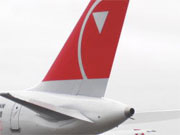|
Audio
Photos
More from MPR
|
New York, NY — The Air Line Pilots Association has not decided when the strike vote will occur. In a statement, Northwest ALPA Chairman Mark McClain says pilots "must make contingency preparations in order to protect the quality of our careers." McClain described the demands of Northwest management as "overreaching," asserting, as he has before, that pilots might be willing to take down the entire airline rather than accept the job and wage cuts Northwest says it needs to regain profitability.
Northwest repeated that a strike would be illegal. Legal experts are divided on the question, but most admit it is not a well-tested principle of U.S. labor law. In general, Northwest and its pilots and flight attendants are heading into territory that is not well-trodden.
Judge Allen Gropper has continually urged both sides to do what most airlines and unions have done in this situation -- make a deal. Bankruptcy law expert Bob Siegel says it is rare that a judge actually has to make the decision Gropper will face when the trial ends.
"Usually under pressure of the bankruptcy proceedure and the possibility that a contract's going to be rejected, I have seen a pattern where people do work it out," he said.
Judge Gropper recessed the trial early last week, hoping the break would encourage deal-making. Discussions with both unions made some progress. In the case of the pilots, management backed off its proposal to create an entirely new subsidiary to fly smaller jets. But the two sides reportedly cannot agree on who will fly these jets, and for how much pay.
The union says the two sides also differ on whether to grant pilots stock in the post-bankruptcy Northwest. Pilots are also objecting to pay cuts that would average 28 percent, on top of cuts already taken in previous agreements.
The flight attendants have reportedly agreed to a 22-percent pay cut. But negotiations are stuck on a plan to hire non-union, foreign flight attendants on some overseas flights. Northwest says it wants to hire foreign nationals for both cost and customer service reasons. The flight attendants union says the plan would cut 800 American jobs.
Despite all the details before him, Judge Gropper faces a thumbs-up or thumbs-down choice -- can Northwest dump its contracts, or not? Gropper cannot craft contract terms of his own. Since the goal of the process is to help Northwest emerge from bankruptcy, many experts find it hard to imagine he will not, in the final analysis, side with the airline.
Bankruptcy expert Bob Siegel does not expect this would precipitate unilateral action by either side. Instead, he expects the result to be more negotiation, only now the airline would have a strong upper hand. He points to one recent example: the second bankruptcy of US Airways, where a judge did clear the way for the airline to reject one of its union contracts.
"The carrier did not immediately implement changes, but rather sat down with the union and very quickly reached an agreement on a contract that could be sent out for ratification," he said.
Airline labor expert Daniel Petree, with Embry-Riddle Aeronautical University, believes both sides at Northwest are waiting for the judge to rule in order to avoid giving their constituencies the impression they're caving in.
"This way labor doesn't have to swallow hard and take an agreement that they don't really believe is in the best interest of members. Management doesn't have to either back down from a position that they think is essential, from the perspective of the stockholders or the financial community, and they can both look to the judge to take the issue out of contention," according to Petree.
Petree and Siegel agree a strike by pilots or flight attendants still seems unlikely. Neither, however, says the threat can be dismissed. For the company and the traveling public, it is one outcome that would completely change the usual bankruptcy game.





